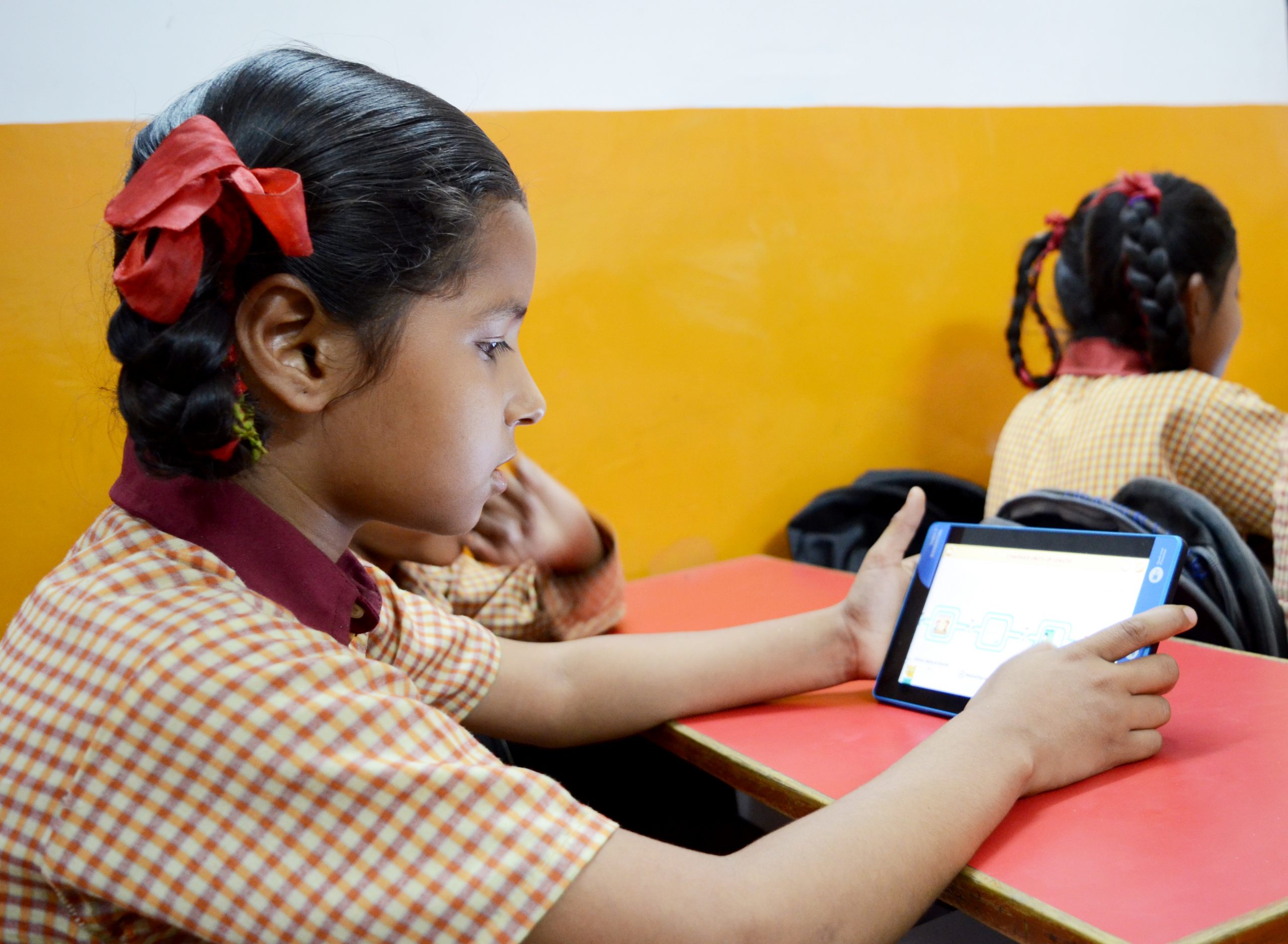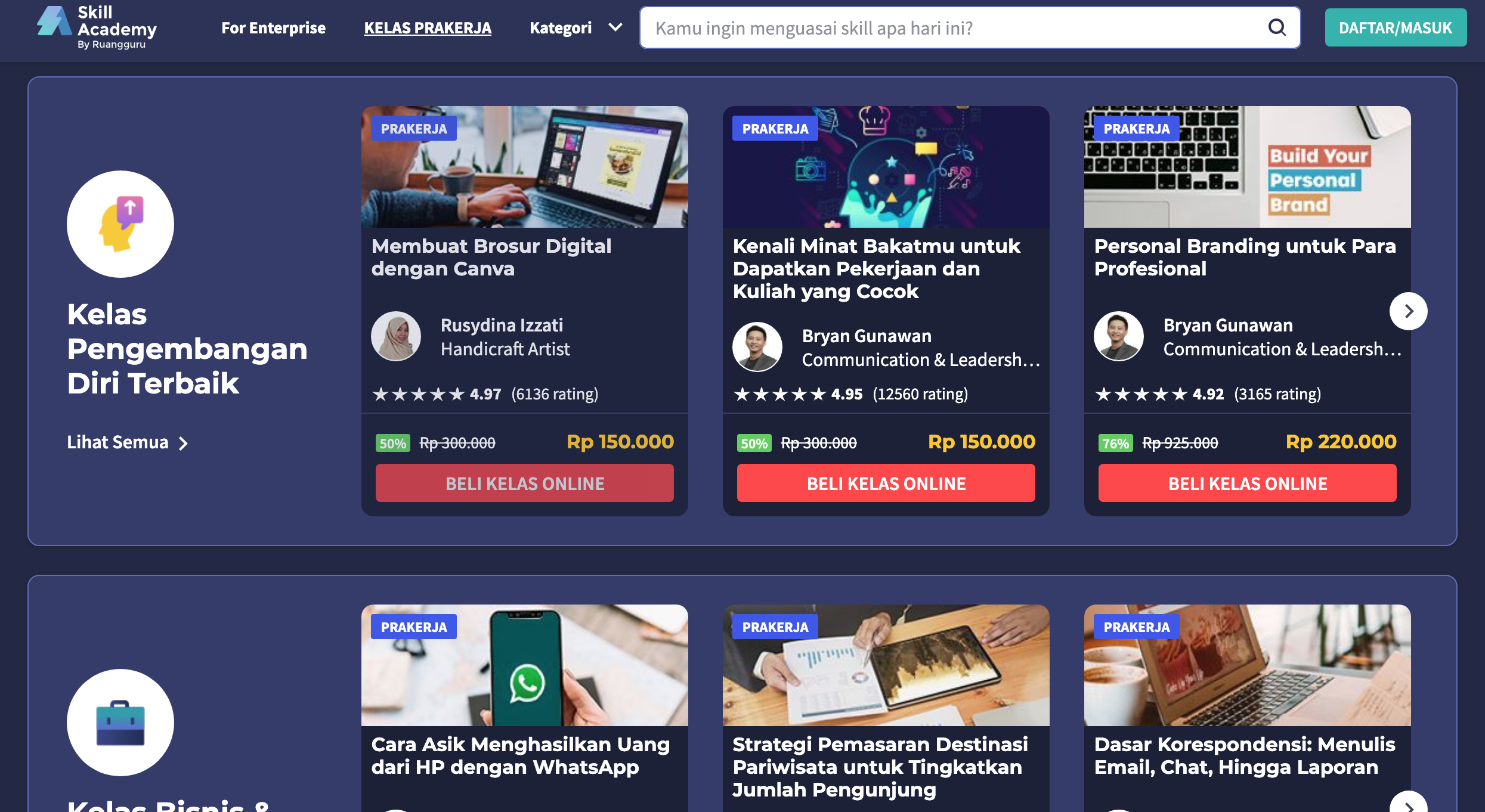Jakarta-based freelance graphic designer Yosepha Ary spent some of her time at home during the COVID-19 lockdowns in April learning new skills. She took a class about user experience design through Skill Academy, a platform managed by Indonesia’s largest edtech startup, Ruangguru.
“I took the class to spend my free time during the pandemic, and the skill will be beneficial for my career,” she told KrASIA. Something that attracted Ary to take the 2.5-hour class was the professor—Luky Primadani, a senior UX designer and researcher at German company FlixBus, she explained.
Like her, thousands of other Indonesians are also enrolling in online classes such as graphic design, programming, animation, and others, offered by edtech firms like Ruangguru, Cakap, Mau Belajar Apa, and US-based Udemy.
During the first edtech boom in Indonesia around 2015, when the majority of local edtech platforms were founded, firms mainly focused on school lessons for elementary and high school students. Math, biology, history, and English were among the most demanded subjects. Still today, according to a study by the World Bank Group, almost 90% of edtech firms target their products and services to students. However, since 2019, edtech firms have started to incorporate practical skills targeting the labor force into their offerings. The pandemic just accelerated this trend.

Edtech revolution
Founded in 2014 by Belva Devara and Iman Usman, Ruangguru offers online courses covering over 100 subjects, mainly for school students. As of December 2020, the company has amassed more than 22 million users across Indonesia, and its rapid growth has put the company on the list of some analysts as a potential next unicorn. The firm raised USD 150 million at the end of 2019.
Ruangguru expanded into the professional market through Skill Academy in September 2019. The platform provides short classes and longer courses on topics including entrepreneurship, communication, and investment strategy, among other skill lessons. These classes are usually mentored by business owners, managers, or directors from well-known corporations, according to the firm. Users who successfully completed classes will receive a certificate from the platform.
The user experience design online class that Ary took in April cost IDR 250,000 (USD 17.75), discounted from the original price of USD 71, thanks to a government initiative named the “Pre-Employment Card Program.”
“Considering the instructor, I think the price was quite okay,” Ary said.
The program offers discounts for applicants willing to join skills training classes, and also provides cash aids of up to IDR 3.55 million (USD 252) after the completion of classes. Coordinating minister for Economic Affairs Airlangga Hartarto explained in an official statement that the initiative aims to improve workers’ skills to suit the country’s labor needs.
Ruangguru was included in April 2020 as one of the program’s first eight digital partners, together with Cakap, an e-learning platform that mainly focuses on language learning. Cakap has also recently expanded its range of offerings to entrepreneurial and self-improvement classes through a new application named UpSkill, launched in July 2020.
“We realize that Cakap has the capability to be a learning platform that can provide solutions beyond language education,” the company’s CEO Tomy Yunus told KrASIA.
The platform, which raised a USD 3 million Series A in December 2020, didn’t disclose its current active user number but said that it has grown tenfold since the beginning of 2021.

Rising demand
Cakap reported a significant growth in 2020, Yunus said. According to a company’s internal survey, the platform experienced a 3000% increase in traffic during the first quarter of last year, compared to the same period in 2019. Its active user number also grew five times.
“The increase was not only boosted by our language lessons but also by the new skill classes,” Yunus explained.
Skill Academy, on the other hand, reports 3.8 million registered users, who have joined over 1,500 webinars held by more than 100 instructors, according to Ruanguuru’s blog.
As per the World Bank, edtech platforms in Indonesia have seen a 200% growth in average in the number of active users and number of apps downloads in March 2020, a clear indicator of the impact of the pandemic on the sector.
To maintain the momentum, the professional workforce is becoming an important target for online edtech platforms, together with university students, Pretty Kusumaningrum, Skill Academy’s manager, mentioned. The market represented by people in the workforce is three times larger than Ruangguru’s core K-12 student market, Kusumaningrum said as reported by DailySocial.
Her statement is supported by official numbers. According to the Indonesian Ministry of Education and Culture, in 2020, there were 45.3 million students enrolled in elementary, junior, and senior high schools, while 3 million were university students. Meanwhile, as per the Indonesian Central Statistics Agency (BPS), there are 131.03 million workers in the country.
“Expanding to the professional market will be beneficial for our business, while we also aspire to address the lack of skill training available,” Kusumaningrum said.
Other edtech platforms are also vying for market share, in a time where the pandemic has left many at home in front of their smart devices. Ruangguru is competing against Zenius and Titik Pintar to capture the K-12 student market, while Cakap, instead, faces competition from Bahaso and LingoAce in the online language learning market.
Mau Belajar Apa, an online marketplace platform that lists various classes for cooking, coding, and foreign languages, and US-based platform Udemy, which entered the Indonesian market in 2019, are also rivals of Ruangguru’s Skill Academy and Cakap’s UpSkill.
A viable growth route, with some bumps
Yinglan Tan, founding managing partner at Insignia Ventures Partners, explained that edtech growth in Southeast Asia is boosted by “gaps” in the region’s educational system.
Most countries of the region struggle with low educational attainment, especially towards the tertiary level, and uneven teaching quality between large and small cities. Parents resort to external learning sources, such as tuition centers or even digital platforms, to address these needs, Tan said.
Edtech platforms can follow two growth routes, a “vertical strategy,” and a “horizontal route”, according to Tan. “The vertical strategy is where edtech firms can cater to the various needs of a specific demographic, for example, K-12 students, from online live classes to test preparation quizzes,” he said.
The other “horizontal” growth strategy, like the one adopted by Ruangguru and Cakap, is when edtechs expand across demographics, content categories, and use cases. “Say from K-12 student’s material to more practical skills,” he said. Yet, this strategy has some snags, Tan explained.
Expanding to a new market, like from K-12 students to workers, may not be cost-efficient, he said. “It may force the company to juggle two customer bases instead of increasing the potential of one.” Maintaining a high-quality user experience for both groups of users might also be challenging, Tan added.
Platforms also have to be able to identify the reasons students sign up for practical skill classes. If students joined primarily because of incentives like the Pre-Employment Card Program, then the market might not be sustainable, Tan said.
“The catch is that skill-based platforms need to crack the market in terms of what skills are worth teaching and who will be there to take these classes,” he added.
As of now, according to the World Bank Group, the sector “is still in its infancy.” Over 90% of local edtech startups have been changing their original business models to achieve greater cost efficiency after identifying new demand, the study found. The report also identified four main challenges affecting the growth of the edtech sector—a low willingness to pay, a resistance to change traditional education methods, poor and limited digital infrastructure, and low digital literacy.
The study highlights that the Indonesian edtech sector is set to emerge from the pandemic with a better outlook for its future. Yet, better government support and planning are required for the sector to thrive.


